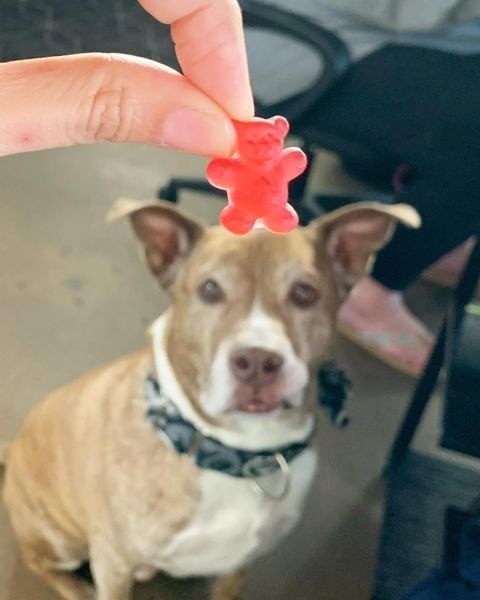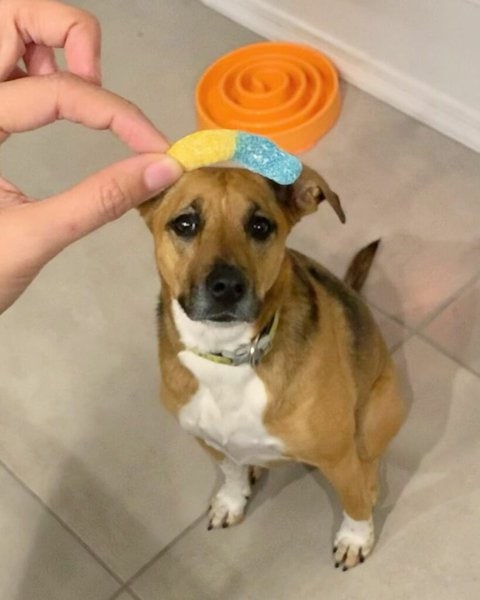Gummy bears are sweet, little edible pieces of delight that humans find irresistible because they are so easy to toss into our mouths. And apart from the fact that they come in all shapes and sizes, their different alluring colors are one of the main reasons we love them and why our furry buddies’ lips smack time and again upon sighting gummy bears. But the question that begs is: Should you give gummy bears to your dog?
No, dogs should never have gummy bears. Among several health threats, xylitol, a significant component of most gummy bears, is a notoriously dangerous substance that attacks the liver and causes low blood sugar, or hypoglycemia, in dogs, leading to death in a matter of days if left untreated.
So, in this article, you’ll learn why gummy bears are dangerous to dogs, whether dogs can eat sour gummy bears and gummy worms, whether a single piece of gummy bear is enough to cause harm to a dog, and what to do when your dog eats gummy bear.
Why Are Gummy Bears Dangerous To Dogs?

There are several reasons why gummy bears are dangerous to dogs. Below is a list of some of the harmful effects gummy bears can have on dogs:
Xylitol Poisoning
The need to avoid the use of calorie-laden and obesity-inducing substances in the production of food and beverages led to the discovery of artificial sweeteners like xylitol. Although xylitol suffices as a wonderful alternative to natural sugar in humans, it has an unavoidable health-threatening downside in dogs.
In contrast to a human, when a dog consumes gummy bears, xylitol quickly diffuses into the bloodstream. The overwhelming presence of xylitol causes an over-secretion of insulin—the hormone responsible for regulating sugar levels—in a dog’s bloodstream, leading to an excessive increase in the oxidation of sugar cells.
In other words, the high amount of insulin released from the pancreas works overtime to address the unprecedented sugar spike, drastically reducing the amount of sugar in the blood and ultimately causing a drop in blood glucose level.
And as you know, glucose in the body is synonymous with energy. Hence, the lack of it leads to weakened blood cells and an inability to transport food and oxygen to the brain and other organs in a dog’s body.
Interestingly, xylitol is commonly found in sugar-free gummy bears and sweets, and eating one or two pieces of these can be fatal, especially to smaller dog breeds like the Chow Chow or the Jack Russell Terrier.
Within minutes of ingesting xylitol, your furry pal may begin to experience specific telltale symptoms such as lethargy, vomiting, weakness, coma, seizures, etc.
Gastrointestinal Discomfort
Other non-xylitol gummy bears contain high amounts of sugar that cause intestinal upset in dogs. What’s more, the sugar blast in your pooch’s system doesn’t only cause gastrointestinal discomfort but also leads to stooling and vomiting.
Intestinal Blockage
Often, dogs snoop around in their owner’s bag, hoovering up sweets and gummy bears with the wrapping. When your canine pal consumes gummy bear wrappings in large quantities, this could lead to a possible choking hazard or intestinal blockage.
THC Intoxication
With the rampancy of THC and CBD edibles, it’s not surprising to find gummy bears made out of these substances. While CBD and THC might benefit humans, they have dangerous side effects in dogs.
And that’s because CBD has a ‘stoning’ effect, and dogs have been known to perform poorly with hallucinating-inducing substances, owing to more enhanced cannabinoid receptors in their brains.
Dog parents who accidentally leave CBD gummy bears lying around for dogs to consume will notice symptoms such as loss of muscle coordination, weakness, and, in worst cases, coma or death.
Obesity
Despite not containing artificial sweeteners like xylitol, gummy bears will definitely have sugar and corn syrup, both of which are not only damaging to your pooch’s health but also responsible for inducing obesity.
The high amounts of sugar in gummy bears can quickly accumulate in a dog’s system and cause rapid weight gain, especially in dog breeds prone to obesity like the Labrador Retriever and the Golden Retriever.
Can Dogs Eat Gummy Worms?

Despite having different shapes and sizes, gummy worms and gummy bears are essentially the same. Hence, gummy worms’ sugar content and ingredients remain as toxic as those in gummy bears, making them unsafe for dogs to consume.
Are Sour Gummy Bears Safe For Dogs?
Although sour gummy bears contain less sugar, they still contain citric acid, which can potentially cause diarrhea and severe abdominal pains in dogs.
In addition, the artificial flavors and coloring used in producing sour gummy bears could trigger allergies in your canine.
Can One Gummy Bear Harm My Dog?
From all indications, feeding a single piece of gummy bear doesn’t have the potential to cause harm to dogs. And that’s because smaller dogs with a smaller digestive tract can suffer more from toxicity than large dog breeds, such as the Rottweiler and Belgian Malinois.
Then again, it all boils down to your furry buddy’s overall health, body size, and the amount of xylitol contained in one gummy bear.
That said, avoid the temptation to feed gummy bears when your pooch makes a pleading face, even if it’s just one. You never can tell the repercussions that may arise. Frankly, it’s not worth the risk.
Alternatively, you can find safer treats such as colorful or sweet like berries or diced watermelon and feed them to your canine instead of gummy bears.
What Should I Do If My Dog Eats Gummy Bears?
Depending on the size of your four-legged companion and the number of gummy bears eaten, the health implications could range from mild to severe, which may call for an easy home remedy or a dash to the vet.
A mild consequence may involve vomiting or stooling, while more grave repercussions such as intestinal blockage and choking hazards could occur. With mild side effects such as vomiting, an anti-vomiting substance, like Cerenia, will suffice. But, in the case of a severe reaction to gummy bears, you’ll need to contact your vet right away.
Furthermore, you’ll have to provide information on how many gummy bears your canine ate and the total length of time passed before receiving treatment.
In severe cases, your canine buddy will most likely spend some days with the vet, especially if it ingested gummy bears rich in xylitol or THC. The duration in the hospital depends on the size of your furry pal and the extent of damage incurred from the consumption of gummy bears.






